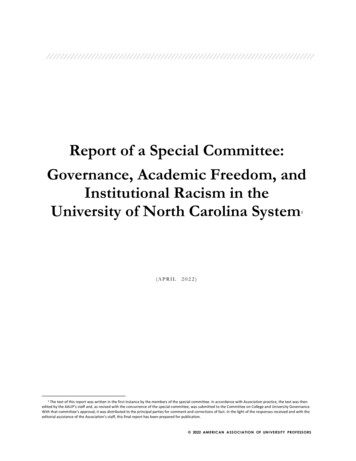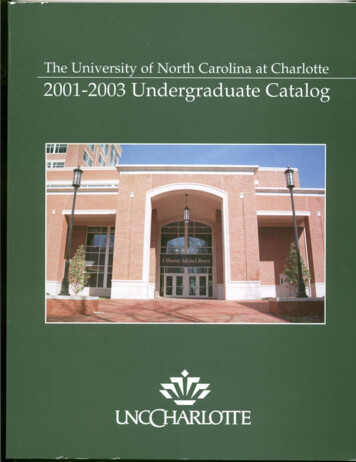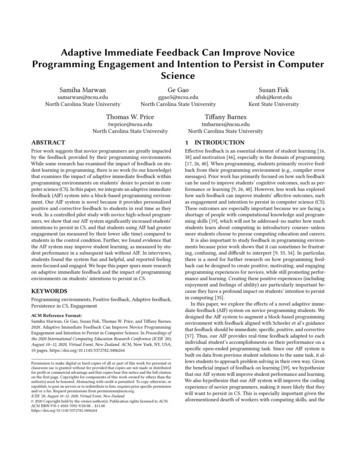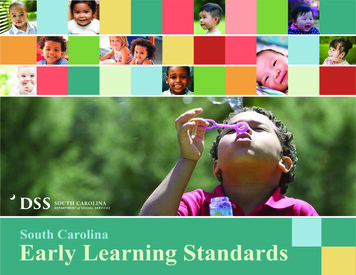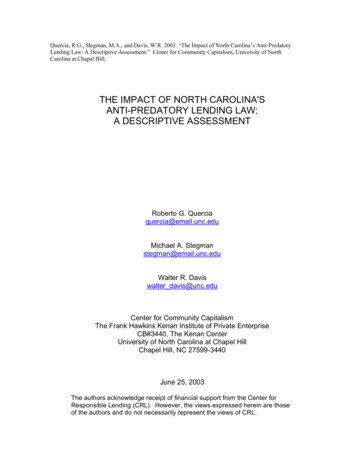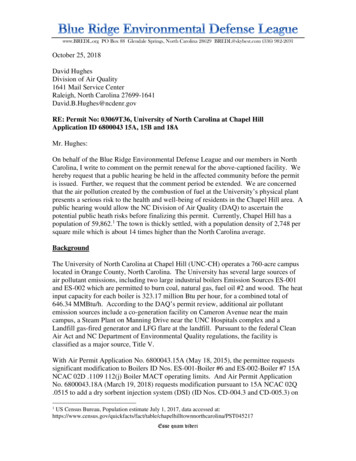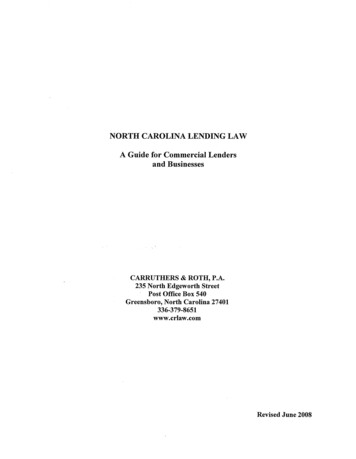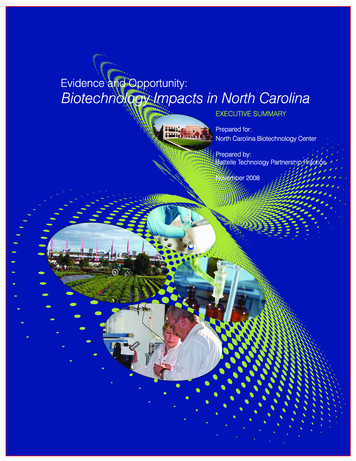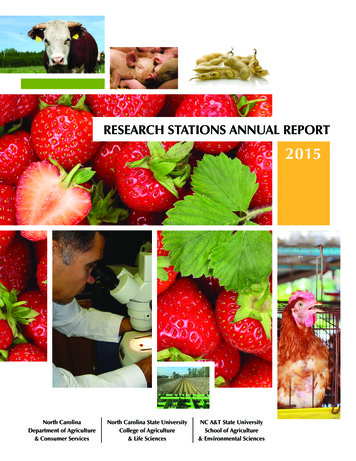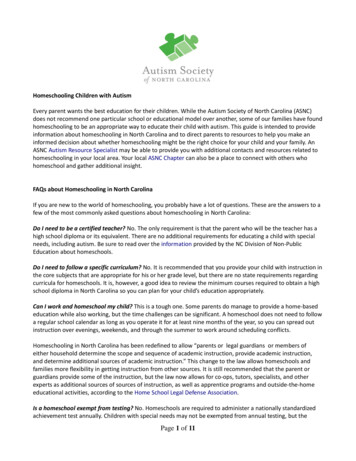
Transcription
Rev. 5/19/21UNIVERSITY OF NORTH CAROLINA AT CHAPEL HILLDEPARTMENT OF CLASSICSCOURSE OFFERINGS FALL 2021**NOTA BENE: See ConnectCarolina for current scheduling information beginning April 26th**CLASSICAL ARCHAEOLOGY CLASSICS GREEK LATINCLASSICAL ARCHAEOLOGY (CLAR)CLAR 120 – Ancient CitiesThe course is an introductory survey of the archaeology of early settlements, polities and urbancenters of the ancient Near East and Egypt; and the Bronze Age, Early Iron Age and Archaic-ClassicalGreek Aegean. We will begin with the earliest known settlements in the Near East, ca. 9000 B.C.,and trace patterns of urbanization as far as the Greek cities of the Aegean in the 5th and 4thcenturies B.C. The purpose of the course is to examine the characteristics of urbanism, and thearcheological evidence for settlement structure, urbanization and state-formation in diversecultures of the ancient Mediterranean world.This course does not satisfy classical archaeology major requirements.This course fulfills General Education requirements: Historical Analysis (HS); World before 1750(WB).Emily Lime emlime@live.unc.edu & Jackson Miller jnm2266@live.unc.eduCLAR/ARTH 242 – Archaeology of EgyptThis course is an introductory survey of the archaeology, art and architecture of ancient Egypt,ranging in time from the prehistoric cultures of the Nile Valley through the New Kingdom. While thecourse will examine famous features and characters of ancient Egypt, it will also provide a wideranging review of the archaeology of this remarkable land as well as the method and theories usedto understand ancient Egypt. Attention will be placed on how major sites and artifacts contribute toour understanding of the Egyptian world-view and its visual expression.This course fulfills General Education requirements: Historical Analysis (HS); Beyond the NorthAtlantic (BN); and World Before 1750 (WB).Prof. Jennifer Gates-Foster gatesfos@email.unc.eduFall 2021UNC Department of Classics1
Rev. 5/19/21CLAR 244 – Greek ArchaeologyThe objective of the course is to introduce students to the archaeology of the Greek Aegeanthrough a chronological and historical survey of sites, contexts, artifacts, monuments andassemblages that comprise ancient Greek material culture from the Bronze Age until the end of theClassical period (ca. 3000-300 B.C.).This course fulfills General Education requirements: Historical Analysis (HS); North Atlantic World(NA); and World Before 1750 (WB).Prof. Tim Shea tdshea@email.unc.eduCLAR/ARTH 268 – Art and Archaeology of the Hellenistic WorldThe Hellenistic period spans the 300 years between the rule of Alexander the Great (336-323 BCE)until 31 BCE, the date of the defeat by Roman forces of the last Hellenistic monarch, Cleopatra VII(along with Antony), at the Battle of Actium. During this time, Greek language, religion, and culturespread far beyond the Mediterranean basin to places and peoples as far distant as Egypt,Afghanistan and India. These encounters altered Greek culture forever and left a lasting impact onthese lands and peoples. In this course, we will focus on the transformations that occurred in themulticultural Hellenistic world, where lands previously governed by the Achaemenid Persian Empirewere ruled by Macedonian monarchs and settled by an influx of Greek-speaking immigrants.The course will discuss major innovations of this period, organized according to topics: (1) the types,design, equipment, and character of cities, including their sacred and civic architecture; (2) thedevelopment of residential and funerary architecture, with a focus on differentiations according tosocial status (e.g. royal vs. non-royal; class; gender; ethnicity) and local-regional customs andpractices; (3) the emergence of new types, styles, and topics in the arts of the multiethnic andmulticultural Hellenistic world; and (4) an integrative discussion of the different categories ofmaterial culture by focusing on royal patronage in select cities and sanctuaries.This course fulfills General Education requirements: Visual and Performing Arts (VP); North AtlanticWorld (NA); and World Before 1750 (WB).Prof. Jennifer Gates-Foster gatesfos@email.unc.eduCLAR/ARTH 462 – Classical Greek SculptureThe course is intended to be a focused, intensive course on Greek sculpture of the Classical period(ca. 500-300 BCE). The popular sculptural styles of this period of antiquity are still used today. Wewill explore how scholars have approached the study of this material and consider its legacy inmodern art and architecture.Prof. Timothy Shea tdshea@email.unc.eduFall 2021UNC Department of Classics2
Rev. 5/19/21CLAR 782 – The Archaeology of Early Iron Age Greece and the AegeanThe study of the material culture of the Early Iron Age Aegean from the collapse of the Bronze Agepalaces to the earliest Greek city-states (ca. 1200-700 B.C.).Prof. Donald Haggis dchaggis@email.unc.eduFall 2021UNC Department of Classics3
Rev. 5/19/21CLASSICS (CLAS)CLAS 55H – FYS: Three Greek and Roman EpicsThe course will involve a close reading of Homer's Iliad and Odyssey and Vergil's Aeneid, and as atransition from Homer to Vergil, we will also read several tragedies of Sophocles from fifth-centuryAthens. Epic and tragedy wrestled with topics central to Graeco-Roman civilization and provided(for good or bad) influential models of heroism and human values for later ages—along with raisingfundamental questions about the individual's relationship to society. We will analyze, discuss, andwrite about these works both as individual pieces of literature in a historical context, and in terms ofhow they position themselves in the poetic tradition; after reading the Iliad and Odyssey, we’ll seehow heroic myth gets reworked for democratic Athens, and then how Vergil combines Homer,tragedy and other traditions to make a new poem for his time. We will look at aspects of structureand technique, questions of overall interpretation and values, and the interplay of genre andhistorical setting.This course fulfills General Education requirements: Literary Arts (LA); North Atlantic World (NA);and World Before 1750 (WB).Prof. Jim O’Hara jimohara@unc.eduCLAS 61 – FYS: Writing the PastThe intersection of history-writing, cinema and fiction will be our focus as we engage with thegreatest Greek historians – Herodotus, Thucydides, Polybius – against the backdrop of modernrenditions of the past and of war in cinema (including Peter Weir’s Gallipoli (1981), WolfgangPetersen’s Troy (2004) and Zack Snyder’s 300 (2007)), documentaries (including Tolga Ornek’sGallipoli (2005)), news footage and short stories. We will examine the strategies of each of ourancient writers in confronting challenges that remain pressing for directors, journalists andhistorians today. These include difficulties of conflicting perspectives, biased evidence, and thelimitations of memory, as well as broader questions about the nature of historical representation.Should it present the ‘warts and all’ truth, or commemorate and memorialize? What balance shouldit strive for between informing and educating us, and providing our entertainment? Where lies theborder between history and fiction? Homer’s portrayal of the legendary past will supply a furthertouchstone. The aim is for students to engage in critical and informed analysis of the strategies ofour three ancient historians in ‘writing the past’, and to draw appropriate comparisons andcontrasts with the challenges that confront modern counterparts.This course fulfills General Education requirements: Literary Arts (LA); Communication Intensive (CI);and World Before 1750 (WB).Prof. Emily Baragwanath ebaragwanath@email.unc.eduFall 2021UNC Department of Classics4
Rev. 5/19/21CLAS 121 – The GreeksThis wide-ranging course introduces the culture, ideas, and achievements (and failures) of theancient Greeks. We will look closely at key examples of Greek poetry, historical writing, art andarchitecture, philosophy and science, sport, and commemorative practices. We will discuss themesincluding religion, democracy, violence, slavery, gender and sexuality, and the Greeks in relation toother cultures. Our main focus will be primary sources: the words and the artifacts of the Greeksthemselves. Readings will include selections (in English translation) from Homer, Hesiod, Sappho,Aeschylus, Pindar, Herodotus, Thucydides, Sophocles, Euripides, Aristophanes, Plato, and Plutarch.Assessment will include short quizzes, short papers, a midterm and a final exam, and participation indiscussions.This course fulfills General Education requirements: Literary Arts (LA); North Atlantic World (NA);and World Before 1750 (WB).Prof. Emily Baragwanath ebaragwanath@email.unc.eduCLAS 131 – Classical MythologyThe purpose of this course is to introduce students to the myths of the ancient Greeks and Romans,the stories about gods, goddesses, and heroes that were told and retold over a period of centuries.The emphasis will be not simply on learning these stories, but on studying them in their historicalcontext. How were they transmitted? What roles did they play in Greek and Roman culture? Whatcan we learn from them about the way that the ancient Greeks and Romans understood the worldaround them? In our explorations we will concentrate on literary texts, especially epic and tragedy,but will also consider visual sources, especially vase painting and sculpture.This course fulfills General Education requirements: Literary Arts (LA); World Before 1750 (WB).Ryan Baldwin rmasato@live.unc.edu & Matthew Sherry msherry@live.unc.eduCLAS 363H – Latin and Greek Lyric Poetry in TranslationThis class will introduce you to the lyric poetry of ancient Greece and Rome, with an additional uniton the Song of Songs from the Hebrew Bible. Our theme will be love poetry. Ideas of love and desireare culturally determined, reflecting assumptions often very different from our own. We will read avariety of poems in the context of their socio-historical settings, and address a range of issuesincluding physical vs. spiritual love, cultural ideals of beauty, literary representations of gender rolesand sexual preferences, and the dynamics of tradition and imitation in literature. This course will betaught as a seminar, allowing for discussion and in-depth analysis of the poetry. Students will writea total of 20 pages during the semester, including an interpretative project and a final researchpaper. There are no prerequisites, but students may find that a basic knowledge of ancient Greekand Roman civilizations will be helpful to them in the class. In Fall 2021, this course will include a 4week unit of collaborative online international learning (COIL) with Prof. Giuliana Ragusa andstudents at the University of Sao Paulo, Brazil.(Continued on next page)Fall 2021UNC Department of Classics5
Rev. 5/19/21This course fulfills General Education requirements: Literary Arts (LA); North Atlantic World (NA);and World Before 1750 (WB).Prof. Patricia Rosenmeyer patanne@email.unc.eduCLAS 711 – Proseminar in Professional DevelopmentThis one-credit proseminar, co-taught by department faculty and occasional guests, will provide anintroduction to some of the skills, practices and issues that are part of the professional lives ofclassicists and classical archaeologists working in post-secondary institutions.Prof. Janet Downie jdownie@email.unc.eduCLAS 901 – Seminar: Politics and PerformanceStudents explore ways politics and performance (both broadly and narrowly defined) shaped andoverlapped each other across the Greek and Roman worlds. Surveying salient passages from earlyhexameter epic to writings of the Roman Imperial Era, ancient literary and philosophical texts serveas a matrix for a variety of modern theoretical approaches to connections between politics andperformance, including (but not limited to): performance studies, sociology, semiotics,phenomenology, new historicism, 'new' and 'old' materialisms, cognitive studies, reception studies,critical race theory, and more.Ancient authors to be read include Hesiod, Homer, Pindar, Aeschylus, Sophocles, Euripides,Aristophanes, Herodotus, Thucydides, Plato, Attic Orators, Menander, Aristotle, Plautus, Terence,Seneca, Juvenal, and more. Weekly readings of selected passages in Greek and Latin (onlyoccasionally more than the equivalent of 5 OCT pages in total) anchor abstract discussionssupported by wide-ranging secondary readings. Students should expect 100–200 pages ofsecondary reading per week, almost entirely in English.Students are asked to present (1) an original, annotated close-reading of a (set of) passage(s); (2) areview, in both oral and written form, of a recent work of scholarship; and (3) an original researchproject, beginning with a formal abstract, developing into 15- to 20-minute mock conferencepresentation during Week 14, and culminating in an 18- to 30-page seminar paper, due by the endof the term.Prof. Al Duncan acduncan@email.unc.eduFall 2021UNC Department of Classics6
Rev. 5/19/21GREEK (GREK)GREK 101 – Elementary Classical Greek IThis course introduces students to the classical Greek language, its vocabulary and syntax, aspreparation for reading ancient literature including Plato, Herodotus, Greek tragedy and the NewTestament. Students will learn about the structure of the language and will build a core vocabularythrough a combination of lecture, oral practice and written exercises. There will be a brief quiz eachweek, two one-hour tests, and a final exam.This course is the first of a two-course Introductory sequence (GREK 101, GREK 102).This course counts towards the General Education Foreign Language (FL) requirement if courses inthis language are taken through Level 3 (GREK 203).Prof. Janet Downie jdownie@email.unc.eduGREK 203 – Intermediate Greek IThis course uses Euripides’ Alcestis, as a means of continuing students' grammatical and culturalintroduction to ancient Greek. Although the shift to a poetic text introduces several novelconsiderations (e.g., metrical scansion, ‘elevated’ vocabulary and literary style, etc.) the goal of thecourse remains to solidify and expand students’ knowledge of core vocabulary and grammaticalstructures first encountered in prose. The Alcestis is remarkable play in many respects, withmemorable characters and quotable lines; it engages with various themes of current interest whileopening up Greek cultural practices (e.g. domestic relationships, religious practice, dramaticperformance, etc.) for further consideration.The course features diagnostic and bi-weekly quizzes; reports on grammatical concepts, lexicalitems, and cultural practices; scavenger hunts designed to help students explore valuable print andonline resources; metrical scansion, memorization, and oral delivery of short passages/scenes; amidterm and final exam.This course fulfills the General Education Foreign Language requirement if successfully completed.Prof. Al Duncan acduncan@email.unc.eduGREK 221/352 – Advanced Greek I/Greek PoetryThis combined class aims to serve two similar undergraduate audiences. GREK 221 is designed forthose with moderate experience reading ancient Greek texts in the original language who seek todevelop their reading facility and comprehension skills. GREK 352, while broadly sharing thismission, expects greater experience and competence from enrolled students, who are expected togo deeper in their linguistic and literary analyses. Both levels provide students with the tools andconfidence to read and analyze Greek poetry. We will focus this semester on Archaic Greek Lyric,Fall 2021UNC Department of Classics7
Rev. 5/19/21using the text and commentary by David A. Campbell, Greek Lyric Poetry (2nd edition, BristolClassical Press, 1982).Course Prerequisites:GREK 221: Successful completion of work equivalent to 2 years of college-level Greek (e.g., GREK203/4).GREK 352: Successful completion of work equivalent to 3 years of college-level Greek (e.g., GREK221/2), or by instructor approval.GREK 221 fulfills General Education requirements: Literary Arts (LA); World Before 1750 (WB).GREK 352 fulfills General Education requirements: Literary Arts (LA); World Before 1750 (WB).Prof. Patricia Rosenmeyer patanne@email.unc.eduGREK 901 – Seminar: Imperial Greek LiteratureThis seminar will provide an orientation to Greek literature of the Roman Imperial period, engagingsome of the major areas of current scholarly interest in the field including: rhetorical education andthe Second Sophistic; poetry, prose and literary genre; performance culture; religious cult in acosmopolitan context; Latin, Greek and linguistic diversity; open textual traditions. We will readselectively in Greek from several ancient authors (Plutarch, Dio of Prusa, Achilles Tatius, Longus,Aelius Aristides, Lucian and others) and widely in the secondary literature. Assignments will includepresentation and discussion of primary and secondary readings, an annotated bibliography and afinal research paper. Seminar meetings at the end of the semester will be devoted to workshopdiscussion of students’ in-progress research papers.Prof. Janet Downie jdownie@email.unc.eduFall 2021UNC Department of Classics8
Rev. 5/19/21LATIN (LATN)LATN 101 – Elementary Latin IThe objectives of this course are to cover the basic elements of Latin grammar, to give somepractice in reading and writing Latin, and to introduce students to Roman civilization through astudy of the language of the Romans. Three sections.This course counts towards the General Education Foreign Language (FL) requirement if courses inthis language are taken through Level 3 (LATN 203).Section 001 - STAFFSection 002 - Elizabeth Needham sen15@live.unc.eduSection 003 - Cole Warlick cwarlick@live.unc.eduLATN 102 – Elementary Latin IIThe objectives of this course are (a) to complete the study of Latin grammar begun in LATN 101 and(b) to look at some of the social and cultural ideas of the Romans as these are reflected in Latinpassages read in class. One section.This course counts towards the General Education Foreign Language (FL) requirement if courses inthis language are taken through Level 3 (LATN 203).Chandler Kendall chandler.kendall@unc.eduLATN 203 – Intermediate Latin ILatin 203 focuses on reading, translation, and regular grammar review. Readings will comeprimarily from Sallust’s Bellum Catilinae. Three sections.This course fulfills the General Education Foreign Language requirement if successfully completed.Section 001 - Sarah Eisenlohr sheisen@live.unc.eduSection 002 - Nick Bolig nbolig@live.unc.eduSection 003 - STAFFLATN 221 – VergilLatin 221 is primarily a literature course; our goal is to learn to read in Latin and appreciateselections from Vergil’s fascinating epic, the Aeneid. We will, however, often review grammar as westudy the poem, especially in the earlier part of the course. We will read the equivalent of twobooks of the poem in Latin (selections from books 1, 2, 4, and 6, totaling about 1500 lines), and thewhole in English. Short translation quizzes, two hour-exams and a final, a lot of discussion of Vergil’sFall 2021UNC Department of Classics9
Rev. 5/19/21Latin style (including meter) and the many issues the poem raises, brief secondary readings andclass reports, and ten pages of writing including a paper.This course fulfills General Education requirements: Literary Arts (LA); North Atlantic World (NA);and World Before 1750 (WB).Prof. Robert Babcock rbabcock@email.unc.eduLATN 223 – OvidLatin 223 studies one of the masterpieces of Latin poetry, Ovid’s Metamorphoses, an epic from theAugustan age, which tells hundreds of myths about fantastical transformations. We will read theequivalent of three books of the poem in Latin, and the whole in English, incorporating grammarreview as we go; we will also study the reception of Ovid’s tales in modern literature and art.This course fulfills General Education requirements: Literary Arts (LA); World Before 1750 (WB).Prof. Sharon James sljames@email.unc.eduLATN 332 – Roman ComedyThis course studies the extraordinary comedy of Plautus and Terence, which can be quite disturbingas well as quite funny. We will read these plays while asking particularly what theyteach us about Roman social life.This course fulfills General Education requirements: Literary Arts (LA); World Before 1750 (WB).Prof. Sharon James sljames@email.unc.eduLATN 710 – Introductory Latin CompositionThis course is a deep look at Latin grammar, syntax, and stylistics in a wide range of Latin authors,with particular focus on prose authors and texts on the departmental reading lists. Each classmeeting will include translating assigned passages, discussing the style of those passages; studentreports on individual authors; and in-class group composition exercises. We will review Latingrammar by working through Bradley’s Arnold Latin Prose Composition, concentrating on thechapters that deal with complex sentences. Students, randomly assigned to small groups, willproduce together and present to the class translations into Latin of specific exercises (thecomposition portion of the class will be entirely in-class, group work, not homework). The goals ofthe class are to develop an appreciation of Latin prose style and how to describe it, to readexamples of the best Latin stylists of the ancient period, and to enhance the students’understanding of grammar and syntax through the hands-on experience of writing Latin. This class isopen to all graduate students and to advanced undergraduates.Prof. Robert Babcock rbabcock@email.unc.eduFall 2021UNC Department of Classics10
Rev. 5/19/21LATN 901 – Seminar: Didactic and SatireThis seminar will look at similar problems in the analysis of both genres, including the question ofthe sincerity/authority/undercutting of the speaking/teaching voice. To some extent the course willbe about whether thinking about didactic (and recent scholarship on didactic) can help us withsatire and vice versa. Latin readings will focus on Horace’s Satires and Juvenal, as well as chunks ofLucretius 1, 3 and 4, Vergil’s Georgics 1-2, Horace’s Ars Poetica and Ovid’s Ars Amatoria. Additionalprimary readings (some in English) and secondary readings may be in or about Hesiod,Aristophanes, iambic, Callimachus’ Aetia, Aratus (and imitators), Ennius, Lucilius, Horace Epodes,Epistles, didactic bits of Ovid Met.1 and 15, and possibly Manilius, and mention may be made ofPhilodemus, Perseus, Petronius, Apuleius, [Sen.] Apocolocyntosis, etc.Prof. Jim O’Hara jimohara@unc.eduFall 2021UNC Department of Classics11
Rev. 5/19/21 Fall 2021 UNC Department of Classics 4 CLASSICS (CLAS) CLAS 55H - FYS: Three Greek and Roman Epics The course will involve a close reading of Homer's Iliad and Odyssey and Vergil's Aeneid, and as a transition from Homer to Vergil, we will also read several tragedies of Sophocles from fifth-century
